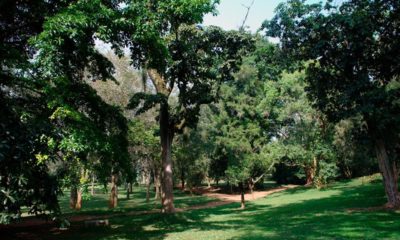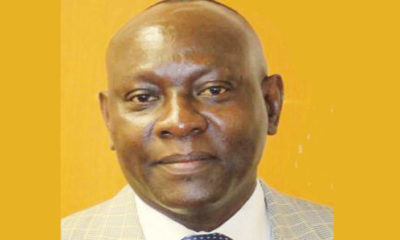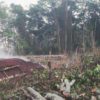Editor
Nwoya; Uganda’s hub for foreign commercial farmers
Northern Uganda has arguably the most fertile soils in Uganda. This asset is complemented further by the sparse distribution of the population, generally flat terrain that allows for mechanization of the land plus easier access to water for distribution.
These three factors have played a major pulling effect for not only local investors into setting up agricultural farms but also for foreign profit-oriented commercial farmers who have set up some of the biggest and most sophisticated agricultural business operations in the country mainly focusing of production of cereal crops.
According to local government authorities, Nwoya district, which was curved out of Amuru in 2006, currently hosts 26 commercial farms whose area of operation ranges between 200 acres and 7.500 acres. Some of the food produced by the commercial farms is sold to bulk buyers such as the World Food Programme (WFP) while the rest is exported to neighboring countries such as South Sudan.
Most of the farms employ not just sophisticated machinery but also skilled manpower ranging from tractor drivers to highly skilled personnel like quality control managers.
Rigil Agrotech Limited, an Indian based farm managed by Sharma Kulwinder is one of the commercial farms operating in Nwoya. The company employs about 168 staff and produces cotton, green grams and soy beans which it cultivates on a rotational basis.
Kulwinder takes pride in the fact that his company is able to offer employment to a number of people from different regions of the country.
“This gentleman is from Hoima” said Kulwinder as he pointed to one of his workers. “Some are from Pakwach, Arua.”
He noted that a good number of the company’s technical team such as drivers are from Kenya, while a substantial number of their staff come from across the country in areas such as Gulu, Nebbi, Kampala and Masaka.
Kulwinder also boasts about the fact that his company’s provides other benefits other than salary.
“On our farm we accommodate them, we take care of all their meals, morning breakfast, lunch, dinner. It means we are taking care of them, even the medication, it is free for them,” says Kulwinder.
Land acquisition
Nwoya’s district commercial officer Kenneth Kitara says, the commercial farmers obtained land on a lease basis by negotiating with representatives of communal land.
Skills development
Thanks to the advent of commercial farmers, a number of youth from the region have been able to acquire handy skills such as knowing how to operate tractors.
More encouraging perhaps is the fact that a number of them are women, something that has helped to break long-held beliefs that such jobs are the preserve of the male gender.
Indeed as this reporter found out, a handful of women have broken into the male-dominated fields and are operating Combine harvesters, sprayers, tractors, and several other post-harvest handling machines.
Emily Susan Atim is one of the lucky girls to have found a job at Amatheon Agri, one of the largest farms in Northern Uganda. Amatheon Agri, a multi billion shilling German-owned commercial farm is located on 7,500 acres of land in Lungulu, Purongo and Got Apwoyo Sub Counties in Nwoya district.
Amatheon Agri Uganda limited grows majorly rice and maize for the world market and sorghum to feed the local breweries. The company has ventured into growing of green grams and other crops in a pilot exercise.
Atim 19, is one of the company’s 100 permanent workers. The company also employs an additional 100 casual laborers at peak periods such as weeding and harvesting.
Atim, whose father died in Somalia while serving as part of the Amisom has turned into the major bread winner for her family.
Atim says she’s happy with her job. As a permanent staff, Atim gets a monthly salary of Ushs350,000 which comes on top of free medical cover, NSSF benefits.
Atim noted that her salary helps to pay school fees for her siblings in addition to helping her mother who lives in Gulu to meet basic needs.
“I don’t need much from my salary because here they provide almost everything at the farm from accommodation to feeding, medical care,” she adds: “The technology here is superb. I can access internet and any other necessities that I want from here, so the money I make is mostly for my family to progress in life.”
Atim dropped out of Gulu College School at S.3 in 2016 to decided to join a vocational school with the view to getting a job that would enable her support her family.
“It pained me to see my mother struggling with school fees and feeding us. So when she gave me the idea of training as a tractor driver because there were opportunities at the various big farms in Nwoya, I took it up as a good idea to contribute to the family as well,” she narrates.
It took Atim two months to commit her heart to learning tractor driving from the Youth Empowerment Centre, a charity organization in Nwoya district that equips young people with vocational skills in areas such as mechanics. Her skills and enthusiasm to learn attracted the attention of her tutors who immediately identified a company they believed could offer her a job as a tractor operator.
“We were about 15 girls trained in that lot. We started work at different farms but some droped out of the training because they were discouraged by their friends that tractor driving was a job for men and no man would want to marry such a woman. Others were told that if you drive as a woman your back aches and you will not be able to give birth normally. I didn’t listen to that nonsense because if men were driving and they had no health problems, why would I. I only made sure I consulted with my seniors in the field to be on a safer side,” recounts Atim.
Today, Atim has worked for almost a year and she is the most cherished tractor operator at Amatheon Farm because of her commitment to work and ability to learn new skills fast.
She dreams of becoming a professional tractor driver after further training.
28 year old Ephraim Stephen is another lucky man who secured a job as an agronomist with Amatheon Agri. A University graduate, Stephen expresses satisfaction with his job saying he’s been able to to save money to buy a piece of land back home in Mukono on which he’s building a three bed-roomed house after just two years.”
“I joined Amatheon in 2014. Out there, I was in farmer outreach. Training farmers in farming skills but now, I’ve learnt farm management. You have to follow the daily operations of the farm. From planning to execution. So I have gotten that experience, besides meeting different people from whom I learn more things.” Describing his responsibilities, Stephen says he interfaces the company with the outside public which includes ordinary visitors as well as government officials from the Ministry of Agriculture as well as researchers.
Nancy Akumu, the Sustainable development manager at Amatheon Agri, points out that the company values its human resource because they are what makes machines to function.
Amatheon agri, like other commercial farms in the region has embarked on growing crops this rainy season since they depend on rain fed agriculture.
Akumu projects a bright future not only for Amatheon but also many other companies in the region because of the available potential for expansion, very fertile land they enjoy, but also what seems to be cheap labour.
“I really see a very bright future for commercial farming especially in Nwoya district because as Amatheon Agri we started very small with only one hundred hectare. But now we have expanded. The area under cultivation now as I speak is 3,000 hectare. That means there is high potential because of the fertile soils.”
Analysis
The advent of commercial farmers in the region does not seem to be backed by an enabling legal and regulatory environment that ensures a win-win situation especially for the communities.
For example, Patrick Okello Oryema, the district Chairman of Nwoya district agrees there are no established mechanisms to guide local people to engage in win-win negotiations on the value of land. He told this reporter that the district prefers to use the bottom up approach for land acquisition after identifying conflict free land for the investors.
“We identify land owners with conflict free land and give space for direct negotiation with the investors for lease of at least 49 years, not selling their land. The essence is they rent the land out for a specific period of time after which the land reverts back to the owner.”
In addition, the district authorities seem to be overly interested in attracting investors at whatever cost and do not appear bothered by the need to raise local revenue to support delivery of social services.
Oryema notes that they are still in the process of putting in place an inventory to assess output of the commercial farmers before they can begin to consider asking for benefits.
“We have not done that inventory because we have just recruited a commercial officer whom we hope will do that work for us,” Oryema told The Sunrise. But he was quick to add that Uganda’s policy of not taxing agriculture means the district is unlikely to introduce any taxes on the companies no matter how profitable they become.
“You should also know that agriculture is almost tax free under the law. For now we are not yet gaining apart from the corporate social responsibility they offer to our community like constructing boreholes, clinics donating desks to schools within the district.”
Oryema is happy so far with the fact that a good number of companies are providing employment to local people, even though some of the workers may still need to change their mindset towards hard work and diligence.
“We still need to teach our people to embrace the kind of work done in these commercial farms. Most of our youth are lazy and when they get work in these commercial farms, they are challenged by the demand for hard work and skills application,” said Oryema.
This report was compiled with support from the African Centre for Media Excellence
Comments




























